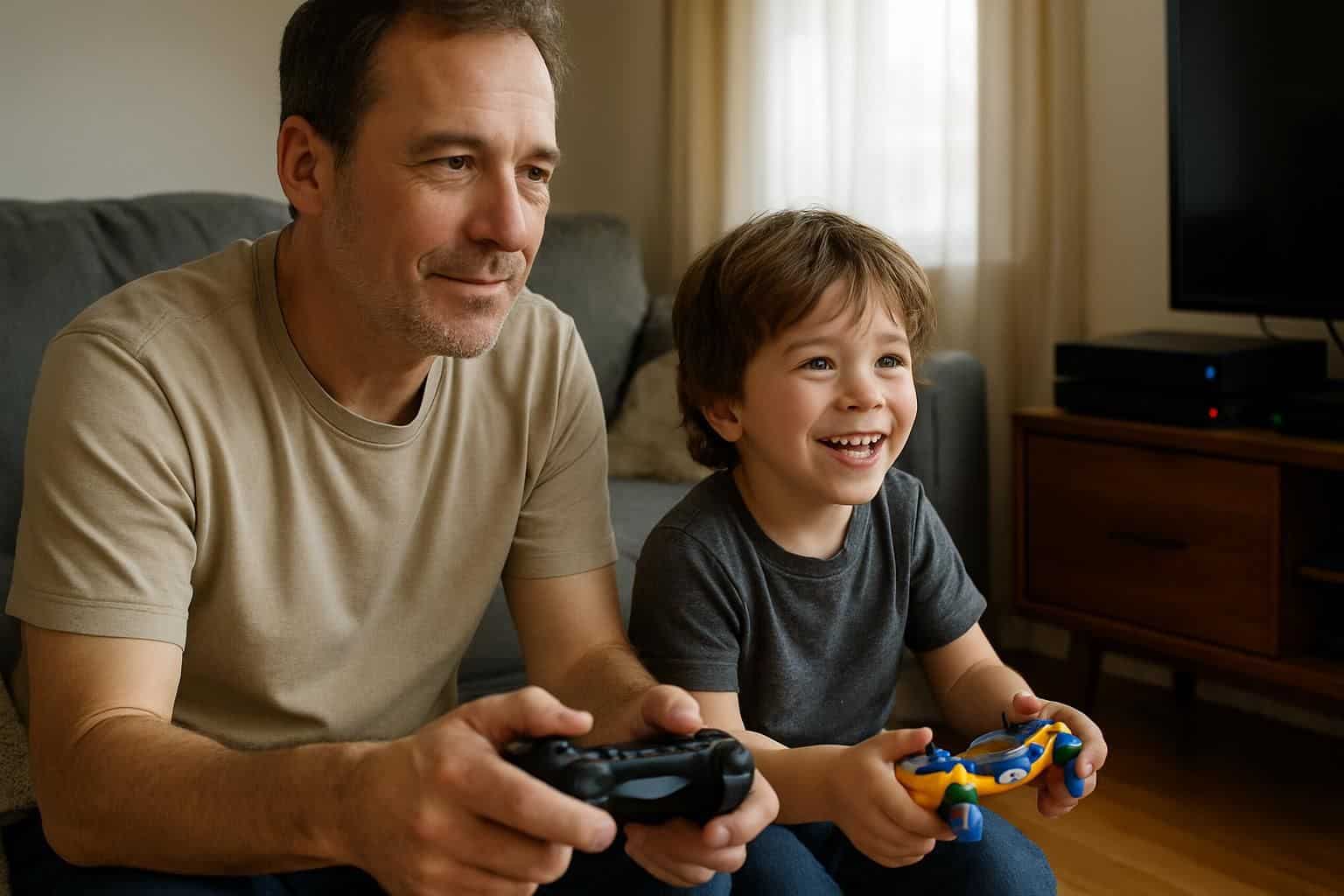Wondering if you’re the only mom asking, “do parents play video games?” Approximately 89% of parents say their kids enjoy gaming, but few adults join in. This article explores how gaming with your family can boost happiness, improve social skills, and enhance parenting.
Keep reading to discover why playing video games could change your parenting for good.
Key Takeaways
More than half (57%) of parents play video games with their kids weekly, typically for 30-60 minutes per session. Many families now prefer digital gaming over traditional board games.
Gaming together can strengthen the bond between parent and child, improving communication and emotional understanding. Child psychiatrists note that shared gameplay reduces anxiety and encourages open conversations.
Parents commonly choose family-friendly genres such as sports (“FIFA Soccer,” “Wii Sports”), puzzles (“Tetris”), racing (“Mario Kart”), cooperative action-games (“Overcooked!”), creative sandbox platforms (“Minecraft”), and adventure platformers like the Mario series.
Despite concerns about excessive screen time and violent content linked to aggressive behavior, setting clear limits—such as one-hour daily for younger children (CDC guideline)—can help manage gaming habits effectively.
By 2025, playing video games will become an even more common family activity as game developers create titles designed specifically for co-play across generations on popular platforms like Nintendo Switch or mobile apps from Apple Arcade.
Table of Contents
Do Parents Play Video Games?

Many parents enjoy gaming regularly, and some even stream their sessions on Twitch. Recent studies from pediatric psychiatry show that moms and dads are playing video games more than ever to relax, bond with teens or peers, or improve mood.
Statistics on parents who play video games
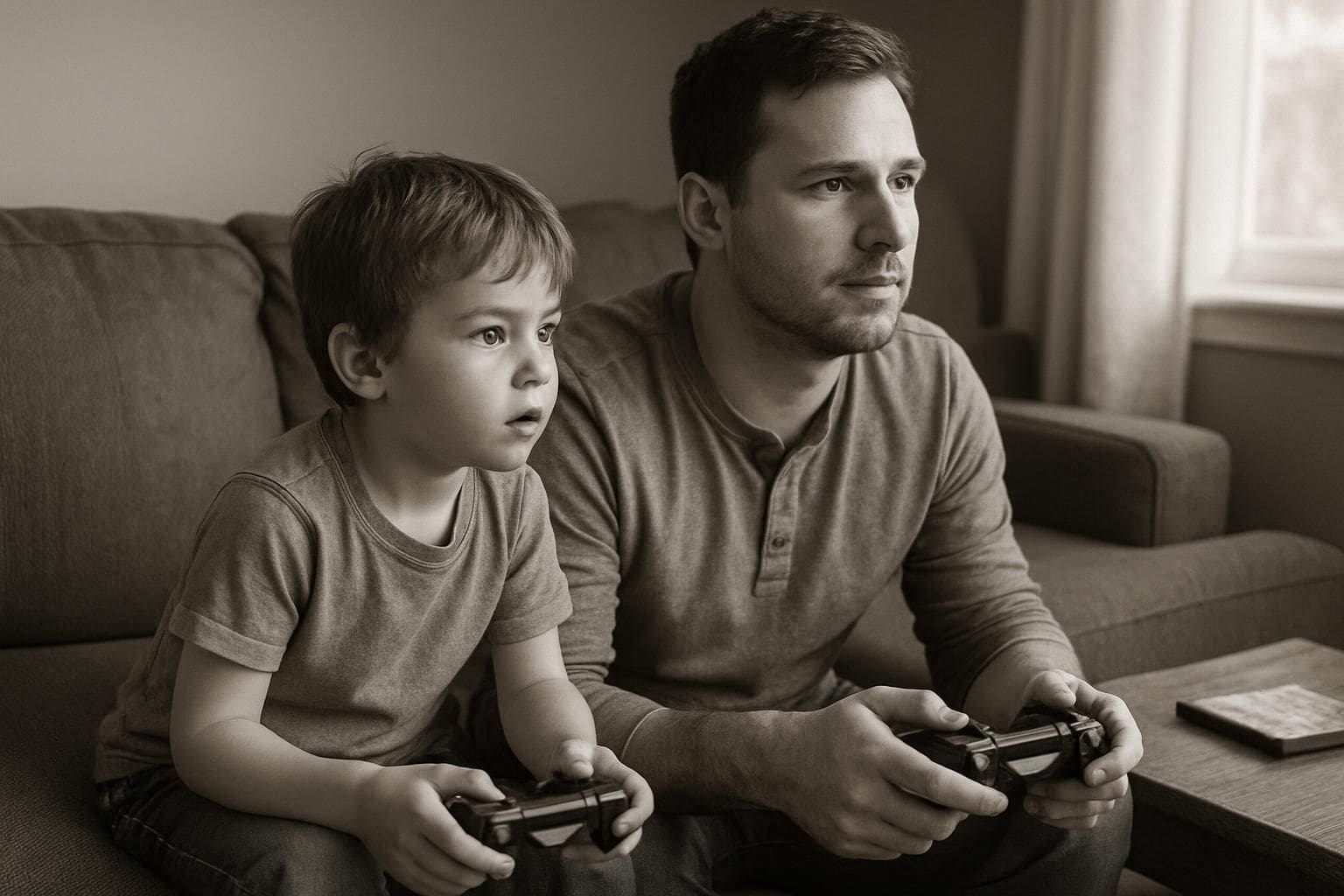
Playing video games isn’t just for kids; parents are joining in on the fun too! Check out these surprising stats on moms and dads who enjoy gaming:
| Statistic | Details |
|---|---|
| Percentage of parents gaming with kids weekly | 57% of parents play video games with their children at least once a week |
| Total adult gamers in the U.S. | 164 million adults played video games in 2019 |
| U.S. households with gamers | Three-quarters of U.S. households have at least one gamer |
| Typical age of players | The average age of a video game player is 33 years old |
Moms are not just spectators; women gamers make up a large portion of the adult gaming community. From mobile puzzle games to console adventures, video games offer exciting ways for parents to relax, bond with kids, and even score great deals on games promotions.
Frequency and duration of gameplay among parents

Parents today play video games more often, and for longer, than many might guess. Here’s a quick snapshot of how often, and how long, parents typically enjoy digital gaming.
| Frequency of Gameplay | Percentage of Parents | Typical Session Length |
|---|---|---|
| At least a few times monthly | 57% | 30-60 minutes |
| Regularly engaged in digital gaming | 55% | 30-60 minutes |
| Families preferring digital to board games (kids aged 4-13) | 47% | 30-60 minutes |
Parents Playing Video Games with Children
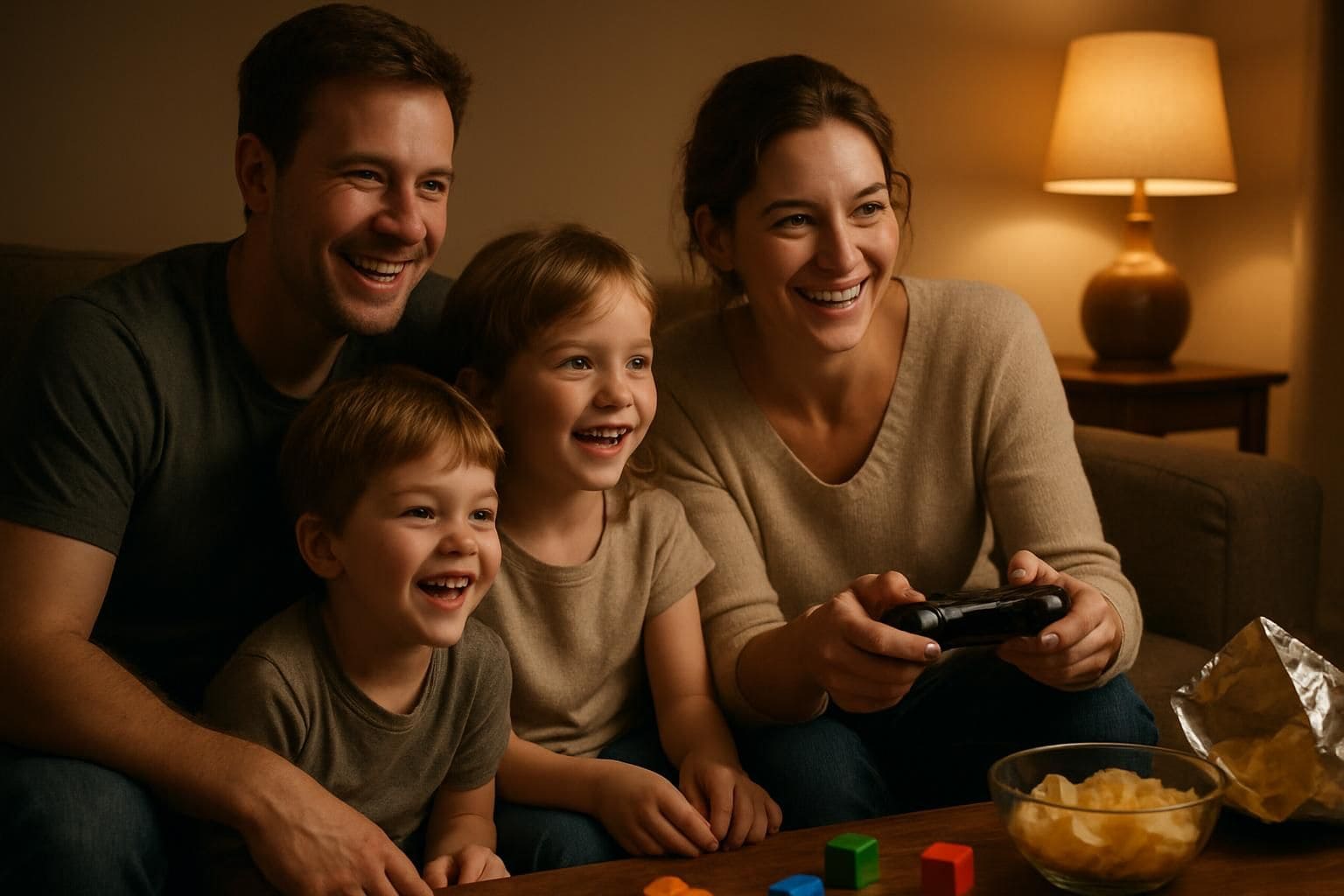
Gaming with your kids can lead to better feelings, shared fun, and stronger bonds in parenthood. Child psychiatrists agree: playing games together helps parents learn about their child’s emotions and screen time habits.
Benefits of shared gaming experiences

Shared video games give parents and kids quality time together. It can ease anxiety, creating natural chances for conversation without feelings of pressure or force. Playing together helps moms better understand their children’s motivations behind screen time, which makes discussing game choices—like violent video games or blasphemous content—feel relaxed instead of stressful.
Trying gaming as a hobby lets you personally check if a game’s content fits your family’s values; attending gaming conventions can also deepen your bond by connecting to things that excite your child.
Engaging in shared gameplay strengthens communication between moms or fathers and kids while enhancing the experience of parenthood itself. According to child psychiatrists, positive parent-child interactions boost working memory and emotional well-being for both sides involved.
Plus, through common interest in different genres like adventure or puzzle games, children often feel more understood; this tends to reduce conflict over screen habits at home.
Popular game genres parents and kids enjoy together
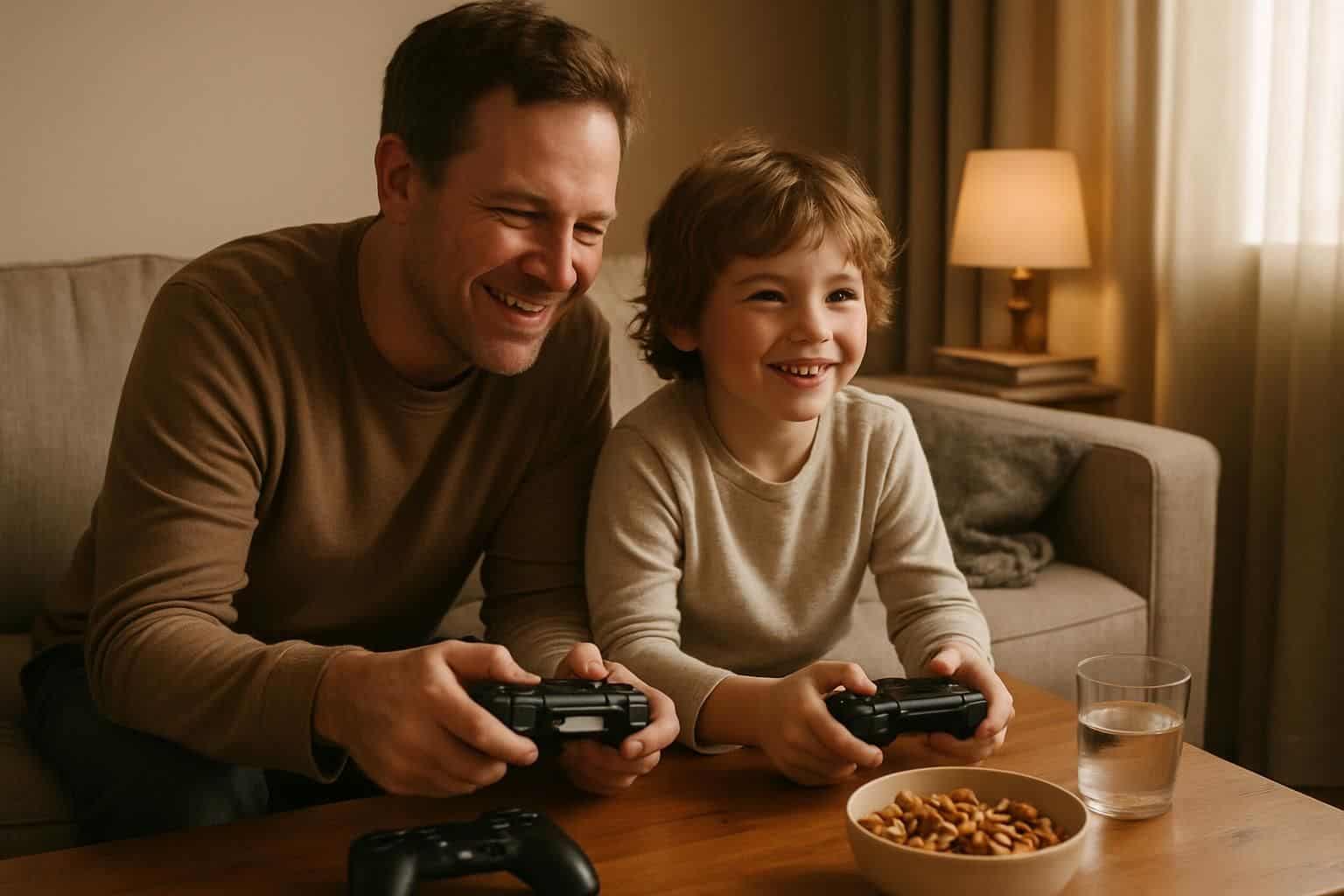
Playing video games with your kids can offer great benefits. It boosts bonding and helps kids develop socially, physically, and in educational ways if you pick games wisely and play in moderation.
- Puzzle Games: Titles like “Tetris” or “Candy Crush” let parents and children solve simple problems together. Playing puzzles improves logical skills, strategic thinking, and teaches patience—good lessons for both ages.
- Sports Games: Family-friendly sports like “FIFA Soccer,” “NBA 2K,” or “Wii Sports” get everyone moving around rather than sitting still. They enhance coordination, teamwork, physical activity, and friendly competition between parents and kids.
- Racing Games: Games such as “Mario Kart” or “Forza Motorsport” allow parents to join their kids on exciting tracks that are easy to learn but tough enough to challenge all players fairly. Friendly races boost quick thinking, hand-eye coordination, reaction times, and strategy skills while having fun together.
- Adventure Platformers: The popular Mario series or titles like “Sonic the Hedgehog” have colorful characters who share light-hearted adventures everyone can enjoy equally well. These games teach problem-solving abilities through exploration; psychology shows this activity supports creativity as well as spatial awareness in children—and even adults benefit mentally from the challenges offered.
- Cooperative Multiplayer Action-Games: Team-focused choices such as “Overcooked!” or the family mode of action-packed Lego-themed video games encourage cooperation among family members instead of competing against each other directly—this builds social bonds naturally within gameplay itself.
- Creative Sandbox Video-Games: Interactive environments such as found in “Minecraft,” inspire creativity because families build new worlds using blocks set freely inside these games’ worlds without strict rules guiding them completely all the time—a perfect way to express artistic ideas collaboratively while strengthening psychological bonds between parent-child pairs along this creative journey they share together virtually on-screen comfortably side by side at home gaming stations everywhere today.
Learning about popular genres is helpful before addressing why some parents avoid playing video games entirely next—an important topic we’ll soon cover more closely now below here clearly outlined ahead right here directly approaching it smoothly from our last discussed section just above shortly ago recently already presented fully before!
Why Some Parents Avoid Video Games
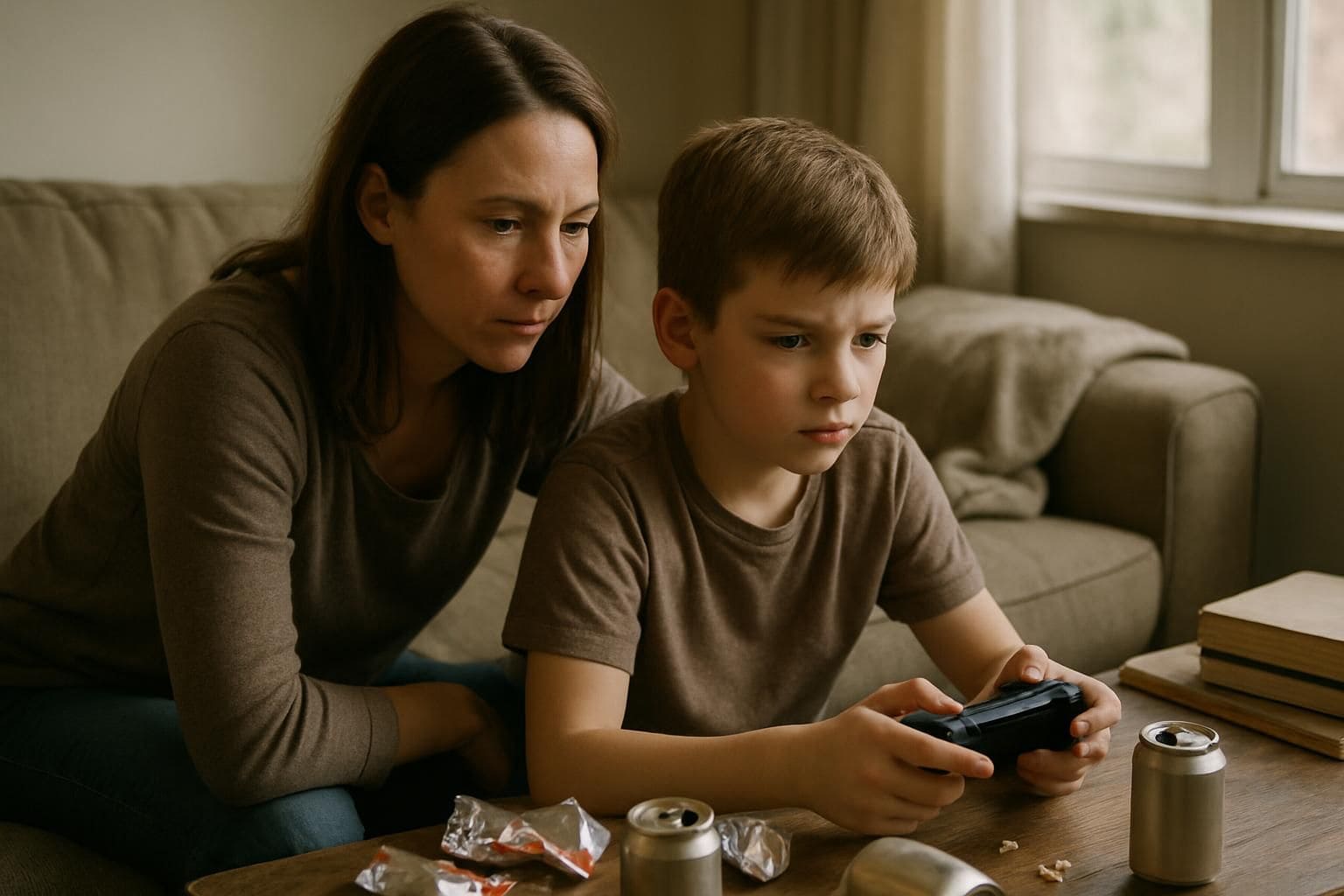
Some parents steer clear of video games, worried about screen time and family routines. Many still see gaming as idle entertainment rather than a useful way to spend quality hours.
Concerns about time management
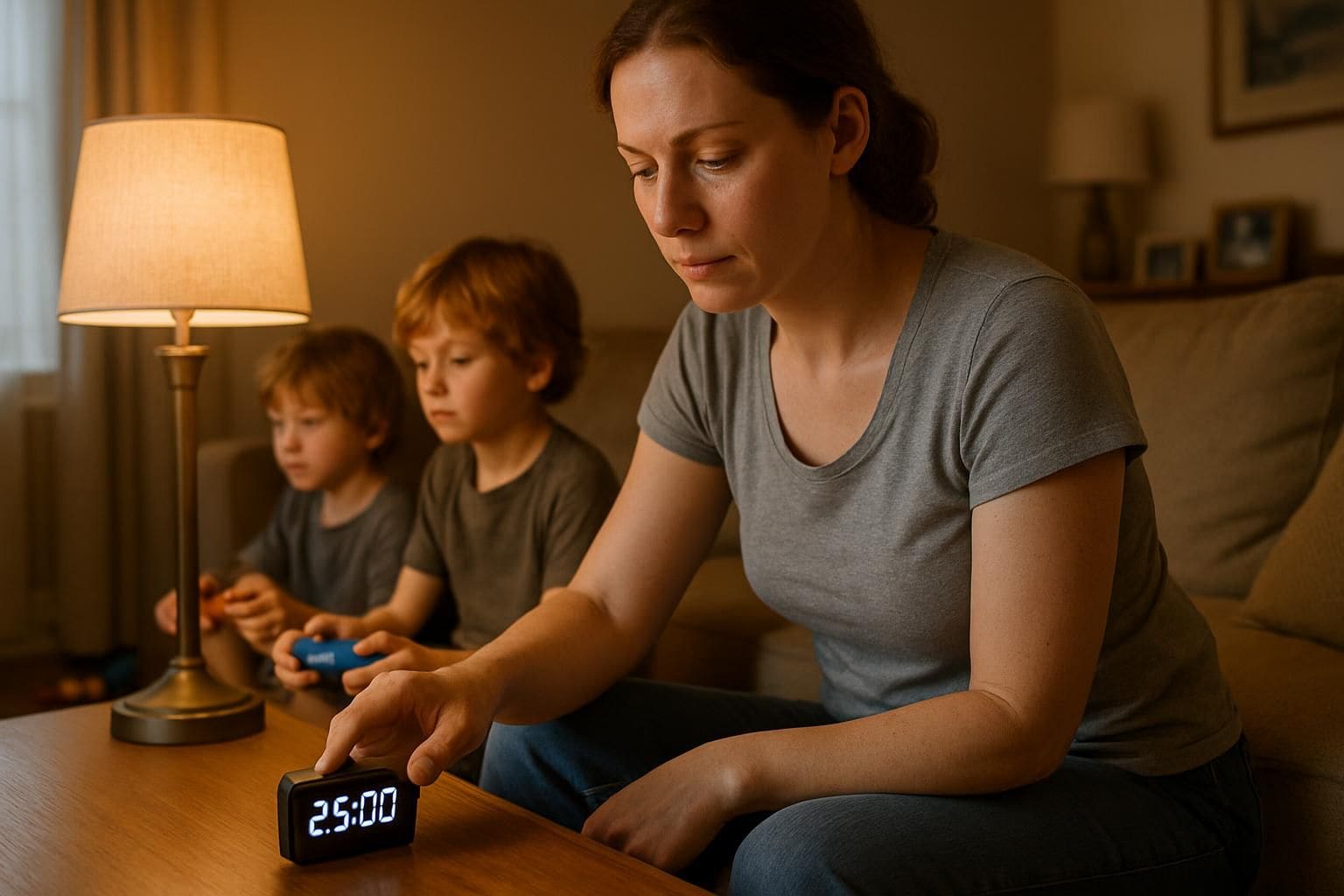
Many parents worry that video games can hurt their family’s schedule and daily routines. Game sessions often run longer than planned, making homework, chores, and bedtime harder to manage.
A common concern is that extended gaming hours might negatively affect children’s school performance or lead to unhealthy habits.
Parents also fear too much screen time may cause addiction or aggressive behavior in kids. Studies show clear guidelines help; setting limits on gameplay can prevent these negative outcomes more effectively than banning video games completely.
One mom noted:
Once I set a timer for game time, my family became calmer and our evenings went smoothly again.
Negative perceptions of video games
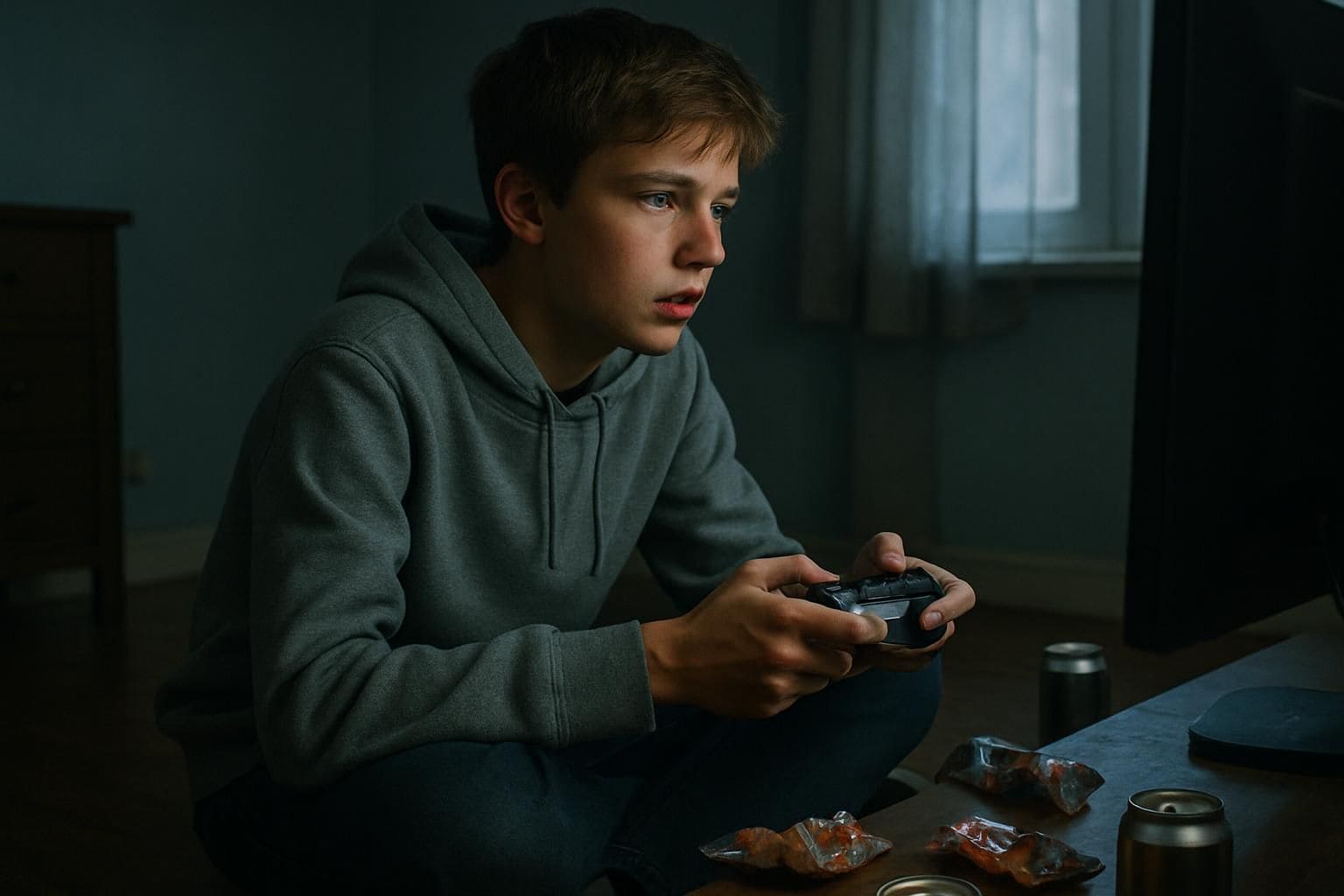
Concerns about time management go hand-in-hand with negative views of video games. Long hours spent gaming make some parents uneasy, especially since playing for extended periods connects strongly to bad impressions about these activities.
In fact, 58% of parents whose kids don’t play video games see them as harmful; another 13% who are raising gamers feel similarly worried. Violent content in popular titles like Fortnite and Call of Duty also fuels anxiety that aggressive behaviors could rise in children exposed regularly to fighting scenes or battles on screens at home.
These fears cause mothers, fathers, caregivers, and educators alike to keep their families away from consoles and computer-based games altogether.
Impact of Parents Playing Video Games
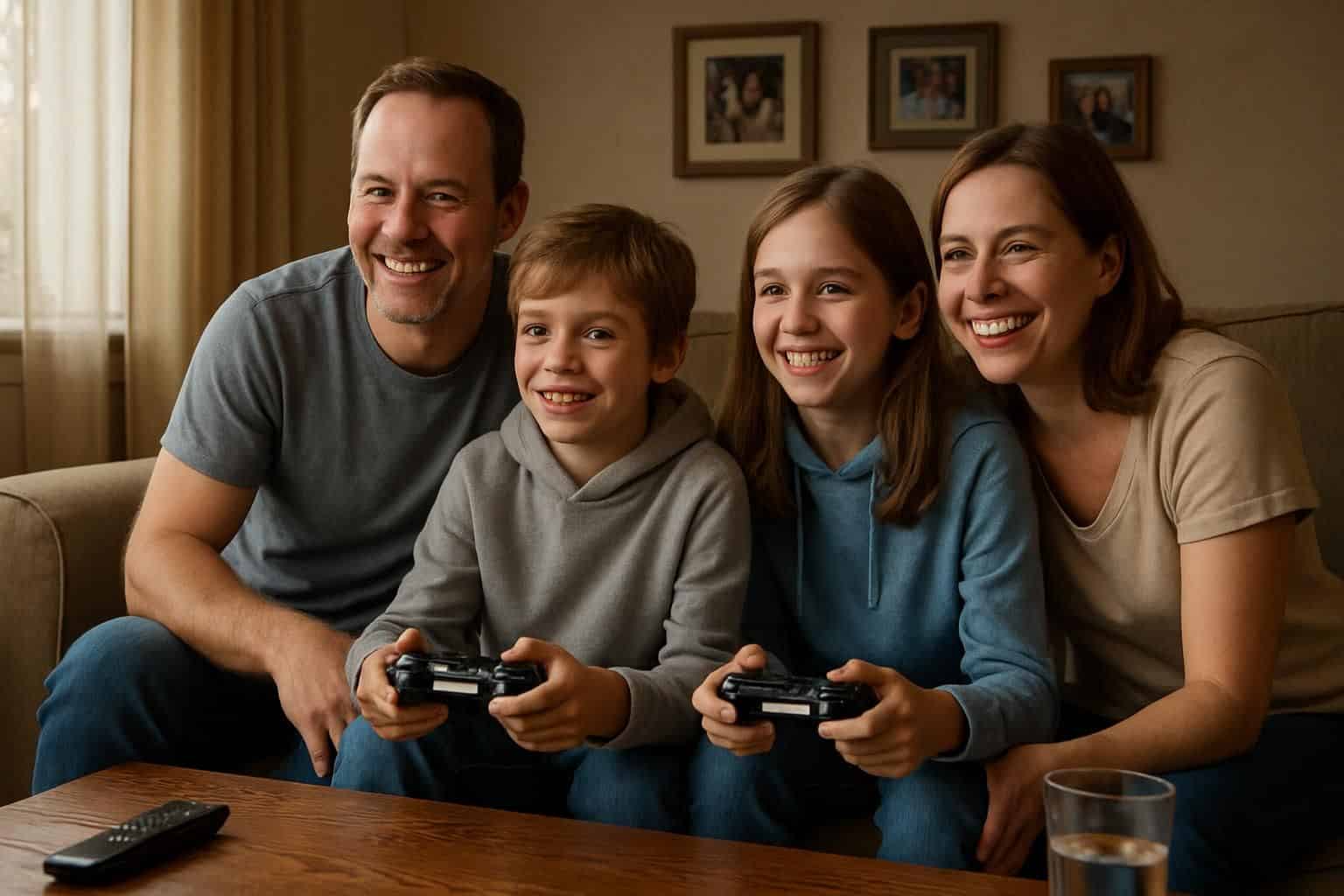
Playing games together can deepen family bonds, making parents and children feel closer and more connected. It also helps parents grasp why their kids enjoy gaming so much, building better understanding at home.
Strengthening parent-child relationships
About 81% of gamer parents join their children in video game sessions. This frequent co-play improves family bonds and creates shared memories. It also encourages real teamwork and builds trust through fun challenges.
Studies show that families playing together often pick games that nurture closeness, like puzzle or adventure games.
Regularly spending time on gaming with your child makes communication better at home and shows interest in their hobbies. These playful moments lead to healthier family interactions overall; that’s because games are good at sparking conversations between parents and kids.
Co-playing sessions make it easier to talk openly about hard topics too, since relaxed settings help both sides listen carefully without stress.
Playing together is not just about having fun—it’s building bridges for open talks.
Understanding children’s gaming habits
Gaming together helps parents know their kids better and grasp why children enjoy games so much. In the U.S., 70% of kids play video games for about two hours per day; that adds up quickly.
Kids like all kinds of games, from action-packed adventures on Nintendo Switch or PlayStation 5 to fun physical activities through active gaming platforms such as Xbox Kinect or Nintendo Wii Sports.
Online multiplayer options in Roblox also appeal strongly to young players who seek social interaction through gaming. At the same time, experts at the American Academy of Pediatrics suggest limiting screen time for kids aged 6 to 18, encouraging no more than two hours daily outside schoolwork.
Balanced screen habits help reduce risks that come with long game times including obesity, eye strain, emotional stress and less face-to-face contact with friends and family members.
Knowing what draws children into digital play makes it easier for parents to pick suitable titles and set fair boundaries around gameplay rules at home—without sparking conflict or confusion between parent and child.
Tips for Parents Interested in Gaming
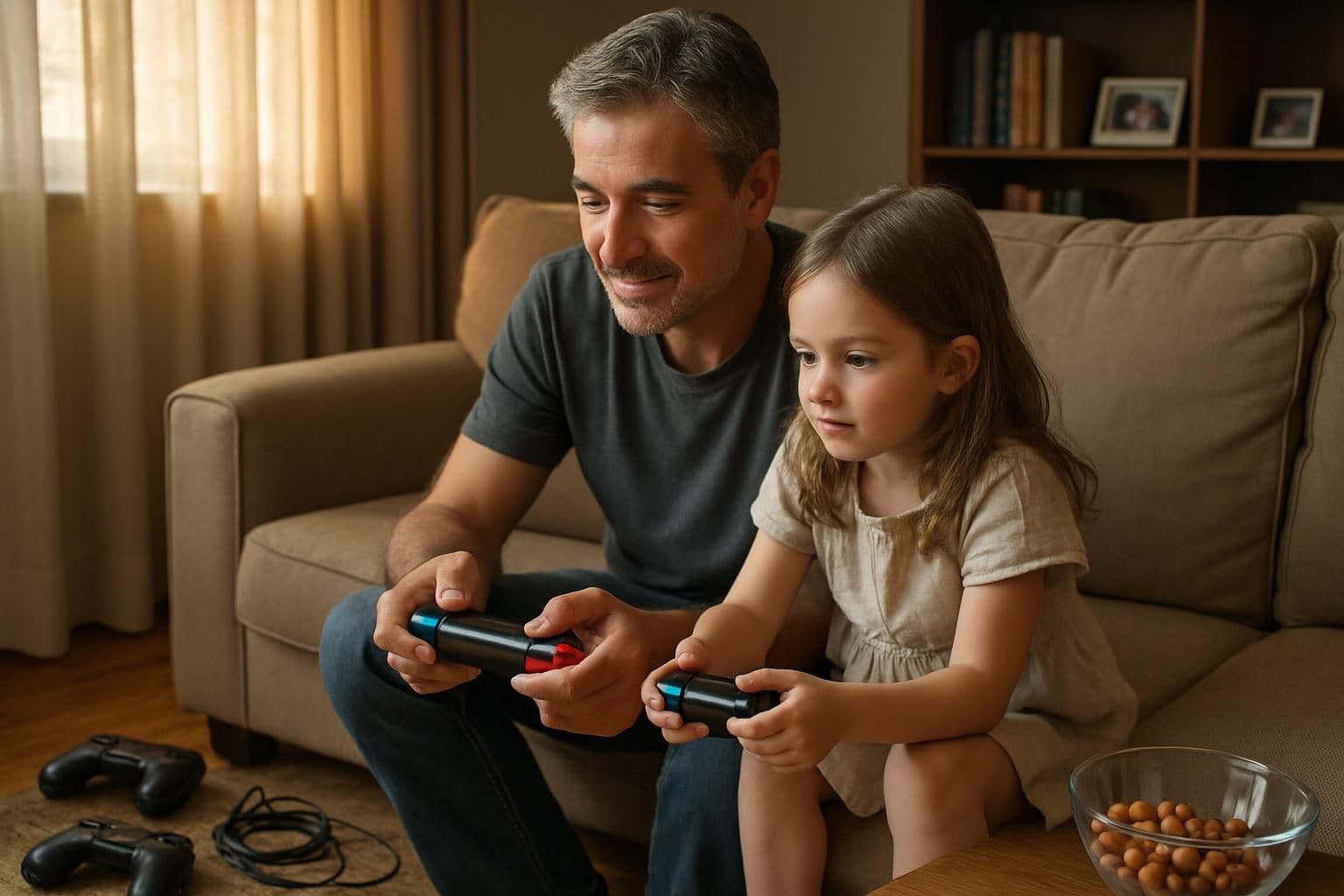
Start by exploring gaming platforms like Nintendo Switch or PlayStation—these are easy to use. Check parent reviews on Common Sense Media, and you’ll find great options for family play.
Choosing age-appropriate games
Picking games right for your child’s age helps create enjoyable and safe gaming experiences. Game rating systems like ESRB, PEGI, and CERO give clear details about the content to expect inside each game.
Reading reviews on parent forums or websites gives helpful insights before making a purchase decision; I’ve found these community discussions very useful in choosing suitable games for my family.
Games developed with learning goals in mind offer great ways to boost children’s skills in critical thinking and decision-making through play. Titles such as “Minecraft: Education Edition” allow kids to have fun while solving problems together or building projects creatively.
Co-playing with your child supports you in gently monitoring what they see online, guiding them towards safer choices, and having important talks about digital safety.
Playing video games together builds trust between parents and children while teaching lifelong lessons.
Setting healthy boundaries for gameplay
Set clear gaming limits based on your family’s daily schedule and core values. The CDC advises a maximum video game time of 1 hour each day for younger children. For older kids, treat gameplay as an earned privilege after they finish homework, chores, or outdoor activities.
Create a family media plan that works with your routine and reflects what’s important to you. Prioritize face-to-face interactions by making sure everyone spends quality time together offline through exercise, meals, or fun hobbies without screens.
How Will Parents and Video Games Evolve in 2025?

Video games in 2025 will become common family activities, boosting play across generations. More parents will see how gaming can positively affect children’s skills and growth. Games made just for co-play between kids and adults will be more popular than ever before.
Mobile gaming will keep growing quickly, letting families bond through simple apps on phones or tablets; I’ve already seen this with my own kids who love playing puzzle games with me after dinner.
Brands like Nintendo and Apple Arcade may lead the way to build new games that families of all ages enjoy together often.
People Also Ask
Do parents really play video games, or is it mostly for kids?
Yes, many parents actively enjoy playing video games. Gaming isn’t just for kids anymore; adults find fun and relaxation in gaming too.
What are some fun benefits when parents play video games?
Playing video games helps parents relieve stress, bond with their children, improve problem-solving skills, boost memory power, encourage teamwork skills, and even enhance hand-eye coordination.
Can playing video games help parents connect better with their kids?
Absolutely! Sharing game time creates common interests between parent and child. It opens up conversations easily and builds stronger family relationships through shared experiences.
Is gaming a good way for busy parents to relax after work?
Definitely yes; after a long day at work or managing household tasks, spending some time on enjoyable video games can help tired moms and dads unwind quickly while having fun at home.
References
https://www.nytimes.com/2020/04/17/parenting/video-games-parents.html (2020-04-17)
https://guof.people.clemson.edu/papers/chiplay21.pdf
https://www.betterscreentime.com/is-3-hours-of-gaming-per-day-really-a-good-idea-for-our-kids/ (2022-11-11)
https://www.mainquestpsychotherapy.com/blog/top-three-concerns-for-parents
https://www.akronchildrens.org/inside/2023/02/13/kids-and-video-games-the-good-and-the-bad/ (2023-02-13)
https://files.eric.ed.gov/fulltext/ED562235.pdf
https://www.handspringhealth.com/post/kid-playing-video-games-benefits-risks-balance (2025-03-10)
https://brightchamps.com/blog/video-games-for-kids/
https://coastalbend.momcollective.com/mom/vga-part-3/
https://beastsofbalance.com/blog/seven-ways-parents-can-encourage-healthy-gaming-habits/
